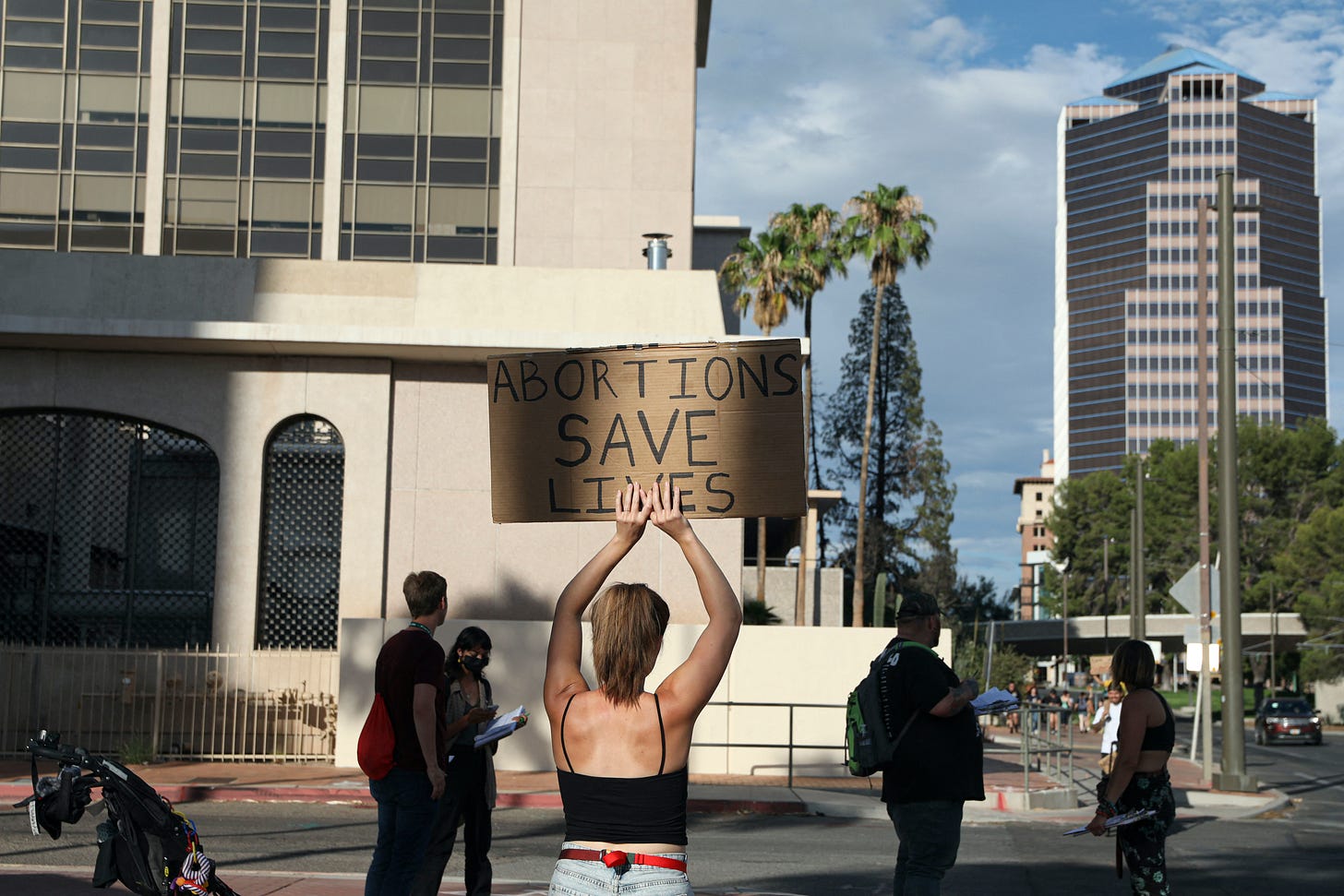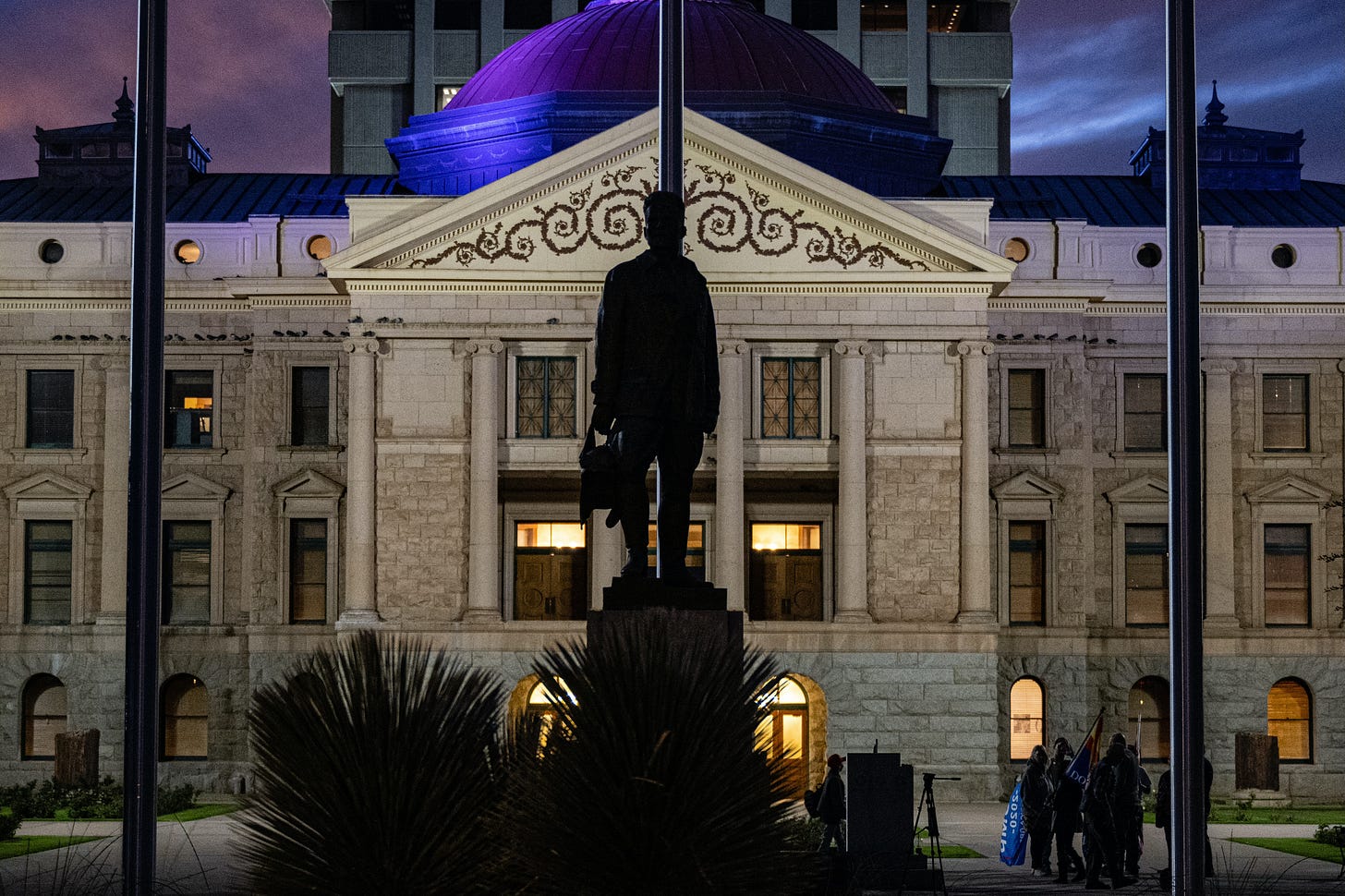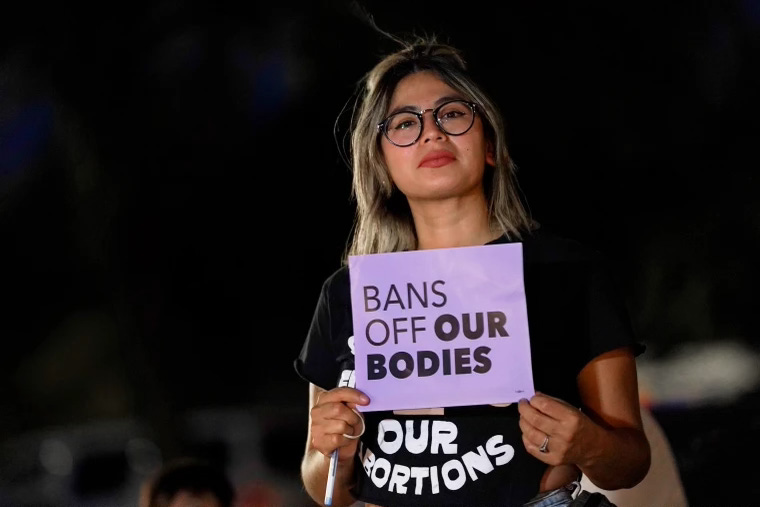
On Tuesday, the Arizona State Supreme Court heard arguments in a case over whether to reinstate a near-total abortion ban that originated in 1864, before Arizona even became a state. The 158-year-old law blocks almost all legal abortion care in the state, forbidding anyone from helping to “procure the miscarriage” of a pregnant woman. The only exception to this abortion ban would be to save the life of the mother — there are no exceptions for rape or incest.
The most recent restrictions pertaining to abortion services in Arizona, were signed into law by Republican Governor Doug Ducey in 2022, mere weeks after the US Supreme Court overturned Roe v. Wade. The law bans abortions after 15 weeks and contains exceptions for medical emergencies, with no exception for rape or incest. With this case, the Arizona Supreme Court will determine which law will remain in effect.
By attempting to resurrect the 1864 ban, Arizona is trying to go the way of other states like Texas and Wisconsin, which have turned to outdated laws that were never directly repealed, but were held in abeyance by the laws established in Roe. Since the Dobbs ruling, these so called “zombie bans” in some states have taken the place of previously established federal law.

Arizona’s ban was initiated under Arizona’s pre-state territorial government, and then later updated and codified in 1901. With a ban on the procedure past 15 weeks, which was signed into law in 2022, the legal uncertainty surrounding how much of the earlier law truly applies has been a substantial problem in the state.
Arguments took place inside a crowded Phoenix courtroom, where six justices took turns grilling attorneys on both sides of the case during the hour-long hearing. Counsel for both sides focused frequently on the issue at hand — the fact that the 15-week ban that was recently enacted in 2022 did not feature any specific language that determined if the law was meant to accompany, repeal, or replace the 1864 ban.
Lawyers on both sides of the oral argument agreed that the two laws restricting abortions were passed more than 150 years apart, but can technically still coexist. The main question to be determined by the Court now will be whether the laws will work together to create a near-total ban on abortion, or if an abortion will be legal for women up to 15 weeks of pregnancy.

At the heart of the argument in Planned Parenthood of Arizona v. Hazelrigg/Mayes, is the intent of Republican lawmakers when they passed the 15-week law, which was signed last year by former Gov. Doug Ducey. Arizona Supreme Court Chief Justice Robert M. Brutinel suggested that the state legislature intended to match Mississippi’s similar 15-week ban that makes elective abortion illegal. “That’s why they passed it,” he said.
Attorney Jake Warner, who is senior counsel for Alliance Defending Freedom, a conservative group providing legal services for legislative leaders and anyone interested in opposing abortion rights in the courts, responded by claiming that state legislators intended to overlay the 15-week law on top of the older ban first crafted in 1864.
Vice Chief Justice Ann A. Scott Timmer countered by saying the Arizona s\State Legislature “could have made it a little clearer for all of us that if Roe v. Wade was overruled [the 1864 law would go into effect].” She went on to add that if that was not the intent of the lawmakers that they could try to remedy that in their upcoming session, which would fix the issue at hand. This is not a very realistic proposition considering that Arizona has since elected a Democratic Governor, who would veto any attempt at restricting abortion rights further.
You can watch Tuesday’s entire hearing here:
While the 1864 law was never formally repealed, an appellate court in Arizona determined last year that the “zombie law” could remain on the books as long as it was “harmonized” with the most recent law banning abortion at 15 weeks. Despite that ruling, there has continued to be confusion in Arizona over which law is actually in effect.
This case was initially brought by an anti-abortion physician, Dr. Eric Hazelrigg, after the Arizona Court of Appeals harmonized the state’s conflicting abortion laws and ruled that abortion could remain legal through 15 weeks of pregnancy.
Dr. Hazelrigg — who is backed by the Alliance Defending Freedom, the same group behind efforts to ban medical abortions and overturn Roe — is asking the court to disregard all other laws permitting physicians to provide abortions in order to impose the stricter ban from 1864. Ultimately, a doctor who had nothing to do with seeking or providing an abortion, is now attempting to exploit the court system in an attempt to ban abortion and deny thousands of women in Arizona essential medical care.
It’s worth noting that the Arizona Supreme Court is comprised of seven judges in total, but currently has only two women sitting on that bench. Seven Justices are appointed by the Governor to serve on the Arizona Supreme Court and they are retained for regular terms of six years. With regard to the team of attorneys representing both sides of the argument on Tuesday — each and everyone of them was a white man.
This case was argued just one day after a Texas Supreme Court ruling overturned an exception to the near-total abortion ban in the state, that ultimately forced a pregnant Texas woman, carrying a fetus with a fatal genetic anomaly, to flee the state in order to receive medical care. A ruling in the Arizona case is expected early next year, just as the campaign cycle for 2024, which will focus on abortion rights, is underway in the battleground state.
While this issue of abortion rights, and the need for further clarification of state laws make their way back up to the United States Supreme Court next year, attempts by conservatives to further restrict abortion rights continue to be opposed by a majority of voters nationwide. The further curtailing of abortion rights — which was already a spotlight issue for political elections in 2024 — has now become a rallying cry for those who oppose abortion restrictions that started this summer thanks to a Conservative majority within the US Supreme Court.
Amee Vanderpool writes and publishes the SHERO Newsletter, is an attorney, author, contributor to newspapers and magazines, and an analyst for BBC radio. She can be reached at avanderpool@gmail.com or follow her on Twitter @girlsreallyrule.
Paid subscriptions and one-time tributes embedded in each article allow me to keep publishing critical and informative work that is sometimes made available to the public — thank you. If you like this piece and want to support independent journalism further, you can forward this article to others, get a paid subscription or gift subscription, or donate as much as you like today.





Just looked up the Dr. who brought the case, his CPC site is called "choices" ... what an absolute piece is shit this guy is. Not surprising he has an extremely lucrative potential by bringing this to the courts. The fact that this man, an actual OB/GYN is able to restrict women's rights for just a blatantly economic reason is absurd.